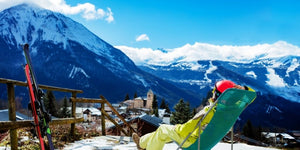Reverse Altitude Sickness In 8 Steps

Altitude sickness (Acute Mountain Sickness) can be a real hindrance to your enjoyment on vacation or to the success of your mountain expedition.
Staying at higher altitudes can leave you experiencing a variety of symptoms like nausea, headaches, chest pain, difficulty breathing, dizziness or lightheadedness, fatigue, or even vomiting.
If you haven't followed any ways to prevent altitude sickness, this walk-through will show you how to reverse altitude sickness and stop the high altitude symptoms in 5 easy steps.
As a precaution if you have a severe form of Acute Mountain Sickness (AMS) such as High-Altitude Cerebral Edema (HACE) or High-Altitude Pulmonary Edema (HAPE), you should seek medical attention right away.
The combination of these 8 steps will help you reverse altitude sickness.
Reverse Altitude Sickness In 8 Steps
As a company with years of experience in high altitudes, we'll share with you the top steps you can take to reverse altitude sickness.
Here's 8 Steps To Reverse Altitude Sickness:
1. Descent Immediately from the high altitudes
First and foremost, if you're already at high altitude and experiencing altitude sickness symptoms, your first priority should be to descend and seek a lower altitude location. Keep moving down to lower elevations.
If you have time to shed some altitude, do it as quickly as possible.
Don't wait if symptoms persist they may only get worse.
The symptoms of altitude sickness will typically occur at any elevation that is above 8000 feet (2500 meters).
More mild symptoms may occur below 8000 feet, but it's a safe altitude to stay at.
2. Move slowly and take it easy
Physically speaking, your body is dealing with all the physiological stress of lower oxygen levels from the altitude.
You want to minimize any physical exertion and allow your body to rest and acclimate to the altitude.
This allows your body to prioritize high altitude stresses to give it time to recover and reverse altitude sickness.
3. Don't drink alcohol at high altitude
This might be obvious to some, but avoid alcohol at all costs while you're dealing with altitude sickness.
When you're dealing with altitude sickness, abstaining from alcohol is one of the best ways to avoid making the situation worse.
Alcohol can worsen symptoms by increasing the workload on your body's already taxed respiratory and circulatory systems.
Alcohol can cause dehydration, and additionally, alcohol can also increase your heart rate and worsen your breathing.
4. Get plenty of hydration
Sounds simple, but research has shown that up to 75% of people are chronically dehydrated. High altitudes make this a lot worse.
Water helps red blood cells collect oxygen in the lungs more efficiently, therefore, helps with breathing.
Water is also necessary for our body's cooling and heating systems.
The
Drink a Lot of Water at a High Altitude recommends drinking a total of 102 to 136 ounces of fluids daily when at altitudes over 10,000 feet.
In addition to drinking enough water, you should make sure you're consuming enough electrolytes, which are basic minerals your body uses to maximize hydration.
5. Get plenty of sleep
Altitude sickness can cause insomnia, making it difficult enough already to get sufficient rest.
However, a good night's sleep can help you get rid of altitude sickness symptoms and acclimate better.
And don't underestimate the power of a little cat nap if you can sneak one in during your day!
6. Breathe deeply and evenly
A way to compensate for a decreased intake of oxygen at high altitudes is to breathe slowly and deeply, taking in air until your stomach expands.
One of the most basic breathing techniques that is used in many sports and health practices is diaphragmatic breathing, also known as abdominal or belly breathing.
This technique facilitates a full oxygen exchange and can help prevent or reverse altitude sickness.
7. Consider acetazolamide
Acetazolamide (brand name called Diamox) is an
altitude sickness medicine that helps treat altitude sickness by regulating the chemical imbalance caused by ascending to a high altitude too quickly.
Acetazolamide can only be found by getting a doctors prescription, so it might take time to acquire the drug and is dependent on the recommendation of a doctor.
8. Take some altitude pills
One of the most effective ways to help is supplementing with
altitude pills or tablets.
Our secret weapon,
Zaca, helps your body hydrate and fuels it with antioxidants to help fight the free radical damage that occurs at high altitudes.
In a study, Glutathione was shown to significantly decrease by 43%-45% at high altitudes.⁵ Zaca is loaded with glutathione.
SOURCES:
1. Breathing Techniques for High Altitudes, Low Temperatures and Running up that Hill
https://www.explore-share.com/blog/breathing-techniques-high-altitudes-low-temperatures-running/
2. Hydration 101: How Altitude Affects Hydration
https://hydrapak.com/blogs/beyond-adventure/high-altitude-hydration
3. Why Hydration Is Critical At High Altitude
https://iantaylortrekking.com/blog/why-hydration-is-critical-at-high-altitude/
4. Why Do You Need to Drink a Lot of Water at a High Altitude?
https://www.livestrong.com/article/435265-why-do-you-need-to-drink-a-lot-of-water-at-a-high-altitude/
5. Effect of high altitude (7,620 m) exposure on glutathione and related metabolism in rats
https://pubmed.ncbi.nlm.nih.gov/11320641/
